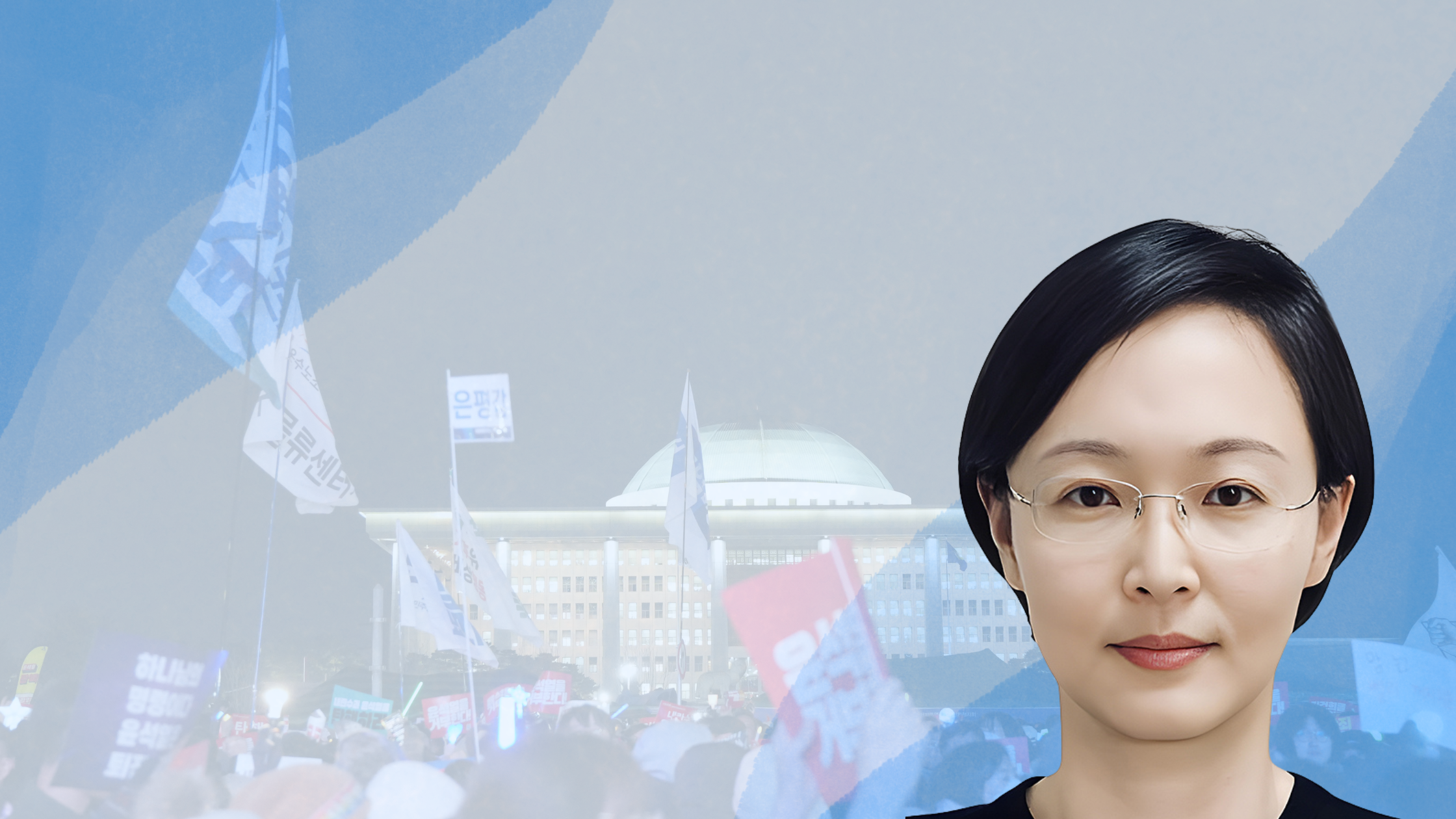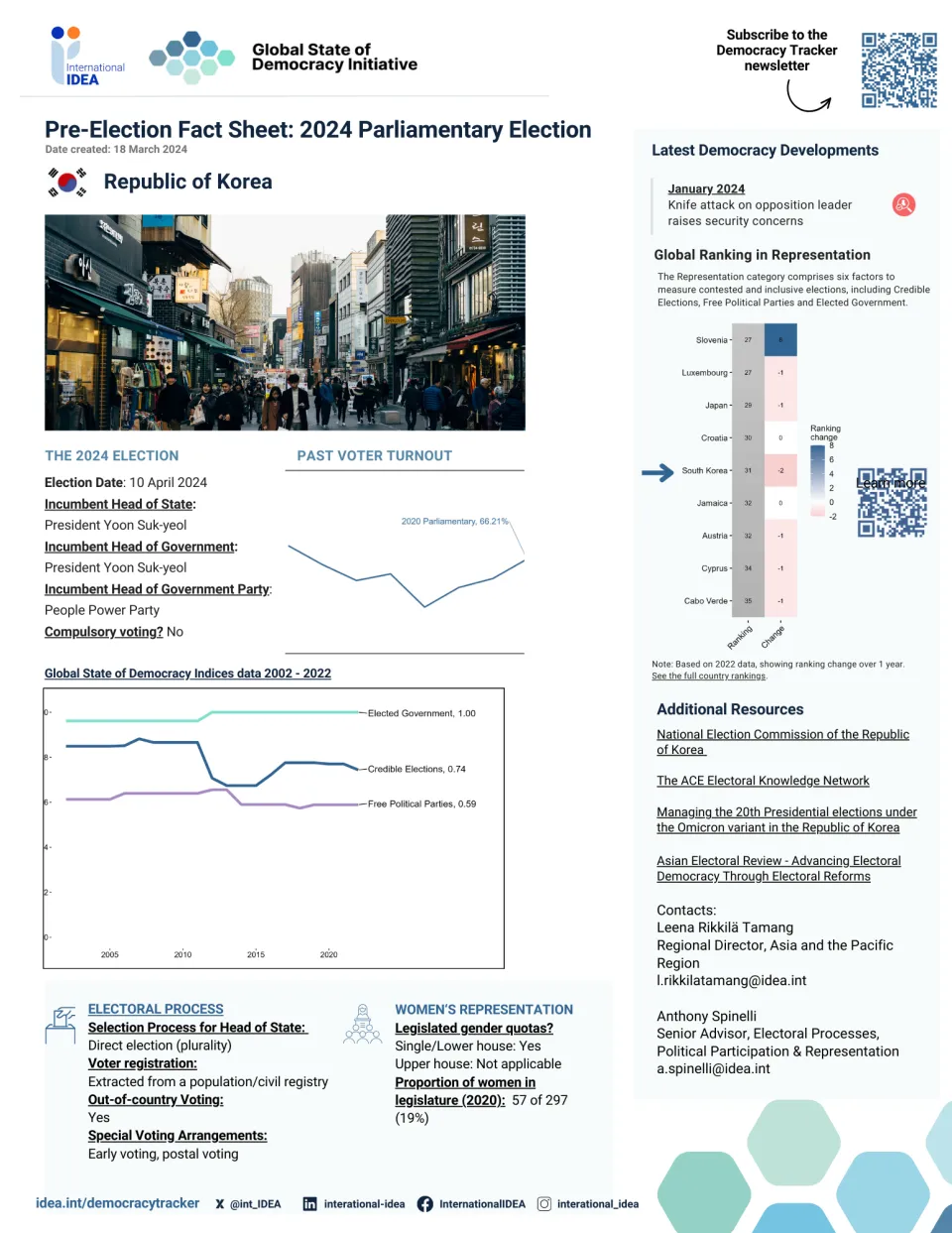
Republic of Korea
The Republic of Korea, also known as South Korea, exhibits high-range performance in the categories of the Global State of Democracy Framework of Representation, Rights and Participation and performs in the mid-range in Rule of Law . It is amongst the world’s top 25 per cent in 15 factors. Over the last five years, it has suffered declines in several factors including Rule of Law, Civil Liberties, Freedom of the Press, and Political Equality, although all remain within the mid to high range. It has not experienced any advances over the same time. South Korea is notable for its rapid rise from relative poverty to significant wealth; today, it ranks highly on the Human Development Index (HDI) and is known for its robust car manufacturing, electronics, and semiconductor industries.
Until the Second World War, the Korean peninsula was a single, united country. As a result of the Korean War, the peninsula was divided in two, with the North and South existing under the spheres of influence of the Soviet Union and the United States, respectively. South Korea was governed by an authoritarian regime until nationwide protests in June of 1987 initiated a process of democratization and political liberalization. Since then, multiple presidents have been removed from the position or sentenced to prison afterwards for their conduct while in office. In 2024, South Korea’s former president Yoon Suk-Yeol abruptly declared martial law, which was swiftly overturned by parliament, resulting in his impeachment and new elections. Today, South Korea’s politics are increasingly driven by polarization, as societal divisions along the conservative-progressive dimension widen; further fueled by the existing dominance of only two major parties.
Despite advancements in education and healthcare, South Korea falls short in gender equality compared to other advanced democracies, evident in notable gender pay gaps and relatively low female political representation. Furthermore, discrimination against LGBTQIA+ people and foreignerspersist, despite some progress for the former. South Koreans also exhibit large age and regional divides in their voting behavior, and additional domestic issues of contention include the strong powers of the presidency and the presence of a chilling defamation law. Foreign policy issues loom particularly large, given the historic and contemporary tensions with North Korea and the long-term policy goal of reunification; South Korean policy towards achieving this objective has long vacillated between a rapprochement-focused ‘Sunshine Policy’ under left-leaning governments and more realpolitik approaches under conservative ones. The U.S. military also maintains a large presence in South Korea, including multiple bases. Finally, relations with Japan have long been challenging, primarily over the settlement of disputes as a result of Imperial Japan’s colonial rule, such as “comfort women”.
Looking ahead, both Representation and Rule of Law should be monitored, especially in the aftermath of the former president’s brief martial law decree and demands for constitutional reform to curb legislative overreach. Actions taken by the Kim regime in the DPRK over the coming years may also adversely impact the South. Additionally, South Korea has the world’s lowest fertility rate and a rapidly aging population, two trends which will pose issues for the country’s economy in the years ahead. Further declines in Freedom of the Press, driven by pressures from government and business interests, also warrant close attention.
Last Updated: June 2025
https://www.idea.int/democracytracker/
January 2026
Lawmakers approve controversial bill targeting fake news
On 30 December, South Korea’s cabinet approved the promulgation of a bill aimed at preventing the spread of ‘false or fabricated information.’ The revised Information and Communications Network Act introduces harsher penalties, including substantial fines and punitive damages, for news outlets or individuals found to have posted false information. Critics argue that the law is too ambiguous as to how fake news will be defined, shifting the responsibility to decide from courts to platforms and regulators. Media unions, journalists and civil society groups have cautioned that the changes encourage self-censorship and may incentivize platforms’ to remove lawful content and introduce a chilling effect on free expression and the press. The law is scheduled to take effect in July 2026.
Sources: The Korea Herald, The Korea Times, Digital Watch Observatory, International Press Institute, Deutsche Welle
August 2025
Former acting prime minister indicted for abetting martial law

On 29 August, prosecutors indicted former Prime Minister Han Duck-Soo for perjury and falsifying official documents related to former President Yoon Suk-Yeol’s decision to impose martial law in December 2024. Han had been impeached in December on similar charges, but the Constitutional Court overturned the impeachment in March 2025 due to lack of evidence. A special counsel team claimed that the Court’s ruling came before sufficient evidence was collected. Han’s first hearing is set for 30 September.
Sources: International IDEA, Anadolu, The Korea Herald
July 2025
Government revises martial law rules to limit executive overreach
On 3 July, South Korean lawmakers voted to amend the existing Martial Law Act to prevent future executive overreach. The revised rules now prohibit military and police from entering the National Assembly without the Speaker's approval and also prohibits any other attempts to obstruct lawmakers, among other provisions. This amendment follows President Yoon Suk Yeol’s abrupt martial law order in December 2024, during which military personnel blocked lawmakers from entering the National Assembly, forcing them to scale the walls to vote down his order. President Lee Jae-Myung promulgated the amendments on 22 July 2025.
Sources: International IDEA, BBC News, The Ministry of Government Legislation
June 2025
Former opposition leader Lee Jae-myung wins snap presidential election

On 3 June, Lee Jae-myung of the Democratic Party of Korea secured a landslide victory in South Korea’s presidential election. The election came six months after former President Yoon Seok-Yul declared martial law and was later impeached. Lee received 49.2 per cent of the vote, while Kim Moon-soo of the People Power Party conceded upon receiving 41.2 per cent of the vote. Voter turnout was estimated at 79.4 per cent, up from 77.1 per cent in the previous 2022 election, marking the highest turnout for a presidential election since 1997. Election observers commended the National Election Commission for taking measures to ensure inclusive and accessible voting.
Sources: ANFREL, CSIS, The Korea Herald
See all event reports for this country
Global ranking per category of democratic performance in 2024
Basic Information
Human Rights Treaties
Performance by category over the last 6 months
Blogs
Election factsheets
Global State of Democracy Indices
Hover over the trend lines to see the exact data points across the years
Factors of Democratic Performance Over Time
Use the slider below to see how democratic performance has changed over time

